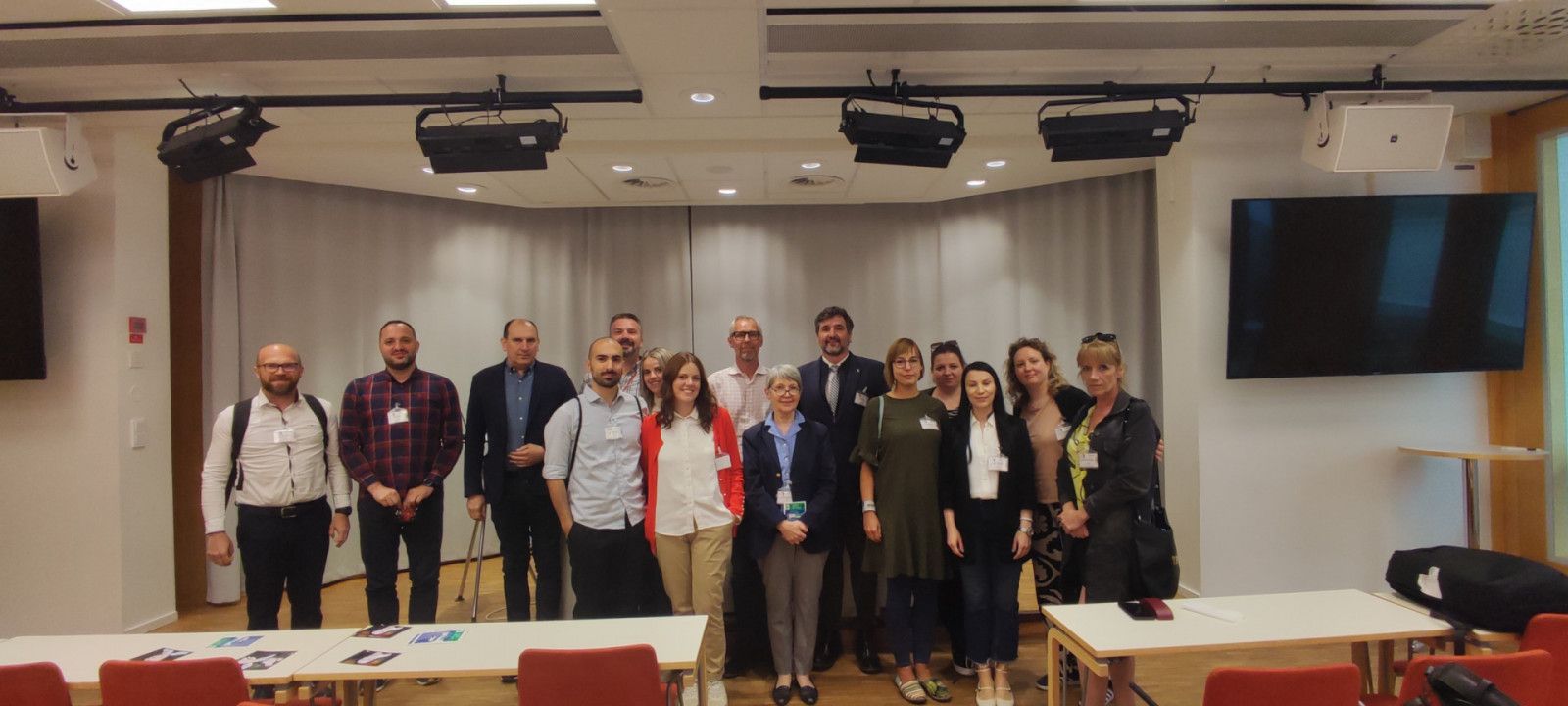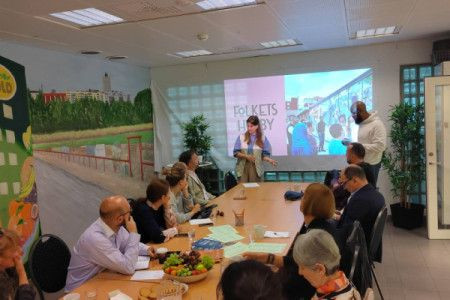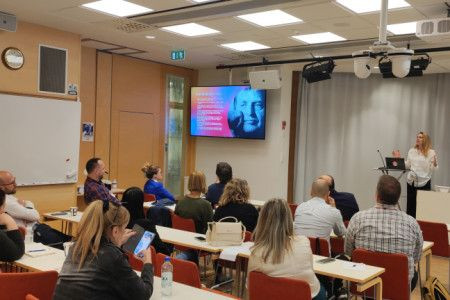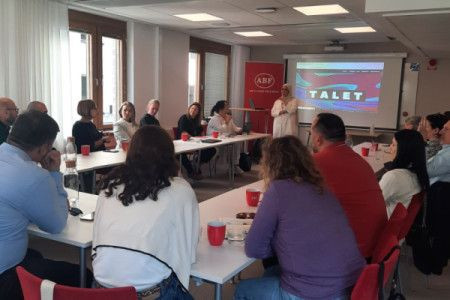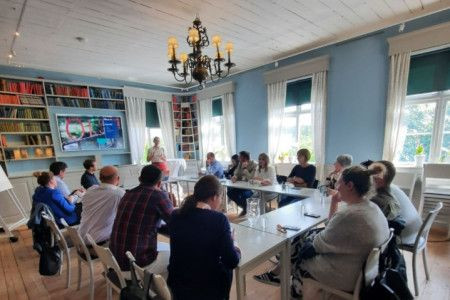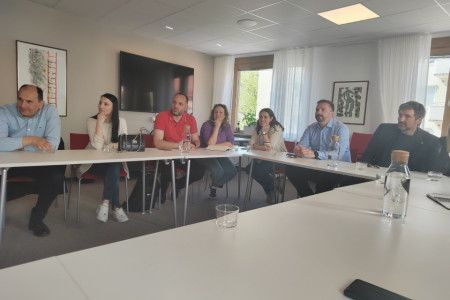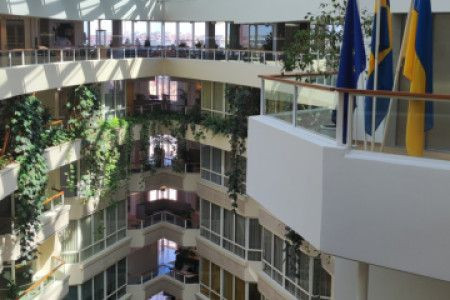Improving specific knowledge and skills related to dialogue with public authorities, designing, monitoring public policies, networking, and getting familiar with the practices of dialogue between CSOs and public authorities in Sweden were some of the goals of the Study Visit organized by the Belgrade Open School in partnership with the Olof Palme Center.
The study visit to Stockholm was held in the period from May 22nd to 27th, 2023 as part of the "Dialogue of Change" Program and brought together a delegation of 15 representatives from civil society organizations supported through the Dialogue of Change Program, as well as representatives of organizations and institutions such as the University of Belgrade and the Ministry of Human and Minority Rights and Social Dialogue.
During the five-day visit, the participants had the opportunity to visit various institutions and organizations and get to know in more detail from different perspectives the practices of dialogue, the mechanisms of participation of organizations in decision-making processes, the challenges they face, and how they overcome them, how they improve practices that contribute to the sustainability or development of some different support programs by the needs of the local communities in which they operate. Below is a summary of the work of the institutions and organizations that were visited.
Adult education circles in support of integration into Swedish society
On the first day of the visit, the Serbian delegation gathered around the Dialogue of Change program visited ABF, the Association for the Education of Workers, one of the oldest organizations that have been operating for over 100 years and that offers a wide range of education, training, culture and places for meetings, taking care that educational services are available to all categories of the population. They are particularly important for providing adult education services and integration support. They base their work on the concept of Folkbildning education.
Discussion with the Agency for Youth and Civil Society
During Sweden's presidency of the EU, the delegation took the opportunity to learn about the practices of institutions responsible for youth issues and civil society organizations. In this regard, the second day of the visit was reserved for socializing with the director of the Swedish Youth Agency and Civil Society Organization - MUCF, Mrs. Lena Nyberg. Nyberg presented us with the concept of youth policy in Sweden and talked about opportunities for financial support - grants for civil society organizations and young people managed by the Agency through various programs.
On the fika with the Olof Palme Center
On the same day, the central office of the Olof Palme International Center was visited, which, as a partner organization in the Dialogue of Change program, is also an international organization that carries out its activities all over the world - in countries such as Burma, the Republic of South Africa, Palestine, but also in the countries of the Western Balkans, which was additionally interesting for the participants of the visit and at the same time an opportunity for networking and establishing initial contacts for potential cooperation in the future.
Development directions of cities and municipalities in Sweden: autonomy as the key to success
Wednesday was spent visiting the Swedish Association of Local Self-Governments and Regions (SALAR), which presented the mechanisms of good budget management of the City of Stockholm and how it was designed, and on which the public policies through which solve the problems and develop the potentials of all the municipalities of both Stockholm and the Kingdom of Sweden. What was extremely interesting to hear in SALAR is the fact that the political engagement of individuals is mostly reserved for the informal part of life, after working hours, with material benefits that cover possible meetings and trips, and that politicians are in the position as a primary occupation with full working time reduces to micro percentages. Also, what characterizes the work of cities and municipalities is great flexibility in management and openness of data on funds invested in the local community for areas of importance for every citizen. About 450 people work at SALAR.
Roofs tailored to tenant’s quality housing
A safe living environment for coexistence in the community is certainly one of the crucial issues and policies that are increasingly coming into focus. In this regard, the Swedish Tenants' Association, which has over 500 000 members is among the pioneers of organizing citizens on issues of local housing policies, issues of regulating the content of "neighborhoods", influencing the preservation of the right to housing, and the like. The association functions based on membership and carries out various activities aimed at protecting the rights of tenants, arranging housing estates, and activities for children and adults in the neighborhoods of the buildings.
National Forum for Voluntary Associations
It represents a network of organizations made up of 35 member organizations such as the Red Cross, religious humanitarian foundations, and associations. The Forum actively deals with public policies and is involved in the work of various working groups at the national level. The Forum presented its work and the way member organizations are represented. A special segment of the session was dedicated to presenting the way volunteers are recruited and selected, how volunteer work is validated, and how, especially young people, are involved in socially responsible business projects in cooperation with companies and various actors in the business sector.
In the Municipality of Ekero
The delegation of the Dialogue of Changes spent the last day of their visit in the municipality of Ekero, a suburb of Stockholm with about 30,000 inhabitants. The Folket Husby organization was visited, which is known as a local gathering place for residents for discussions on various topics in the format of choirs, but also for support programs for young people and adults, young people at risk of social exclusion, young people with deviant behavior and prevention programs. The last in a series of visits was to the Municipality itself, where how ordinary citizens, the local population can be involved in decision-making, and how the municipality consults its citizens on local self-government development management issues were presented.
The study visit was realized as part of the Dialogue of Changes program, which is implemented by BOŠ with partners, with the financial support of the European Union.

 381 60 30 65 800
381 60 30 65 800






